Bangabandhu and the creation of Bangladesh
The following article was contributed by Ambassador Abida Islam of the People’s Republic of Bangladesh in Seoul on the occasion of the year-long birth celebration (17 March 2020 to 17 March 2021) of the Father of the Nation of Bangladesh Bangabandhu Sheikh Mujibur Rahman.—Ed.
It was 1920, a century ago. It was a late spring evening, March the 17th. It was dark all around. It was one of the thousands of villages in Bangladesh - Tungipara at the present Gopalganj district. Born there was a baby boy, affectionately called ‘Khoka‘ - meaning a little boy - by his parents, who half a century later removed all the darkness ad odds; changed the history of the Bengali nation and the world; created an independent and sovereign Bangladesh in 1971.
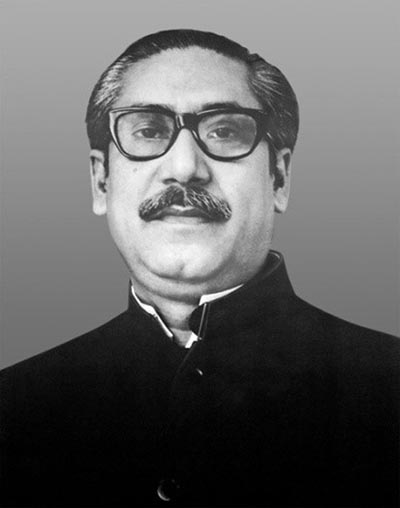
That man, the greatest Bengali of all time, is Sheikh Mujibur Rahman, Father of the Nation of Bangladesh; and our Bangabandhu - Friend of Bengal.
Since his childhood, he was a dreamer, extremely kind hearted, sacrificing, and a voice of protest against any wrongdoing and oppression. Politics, as he simply understood, was for the welfare of the people, to fight for the rights of the people. And he became a natural leader for the struggle of the people, the Bengalis, whether to feed the starving people during the great Bengal famine in 1943, to stop the communal riots in Kolkata in 1946 risking his own life, to play the role of a bright and promising young leader in the anti-colonial movement.
When the partition of the Indian Subcontinent took place in 1947 on a communal two-nation theory, the Bengalis, in the eastern part of Pakistan and being the majority of population of the entire Pakistan, dreamt of a just and fair polity that would ensure their rights as equal citizens of one country, though separated by 2000 kilometers of landmass - India. Within a few months after the partition in August 1947, the majority, Bengalis, in East Pakistan began to realize the ethnic and linguistic discrimination against them.
Bangabandhu always led the people’s struggle from the front - be it the language movement of 1948 to 1952, the elections of 1954, protests against the martial law imposed in 1958 by the military dictator Ayub Khan, movement against the dictatorial regime’s education policy in 1962 that denied the people of their fundamental right of equality and education for all.
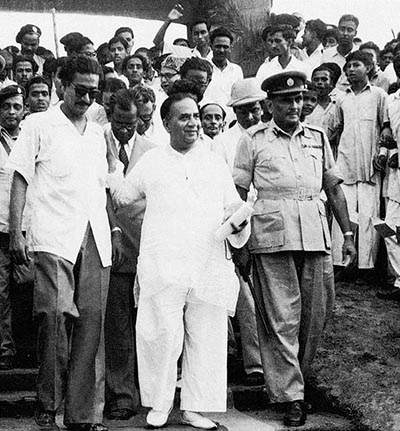
The oppressive nature of the military dictatorship, spreading the sense of deprivation among the Bengalis which was also reaching its limits. And then came the leader again with his visionary six-point demands - justly seeking greater autonomy for East Pakistan - a smartly crafted political strategy that he certainly knew would eventually lead to independence.
Bangabandhu was imprisoned several times by the undemocratic and military regime of Pakistan. In his less than 55 years of life till the emergence of independent Bangladesh, he spent 4682 days or nearly 13 years in prison. But nothing could stop him. He was equally powerful a voice and leader even from within the prison.
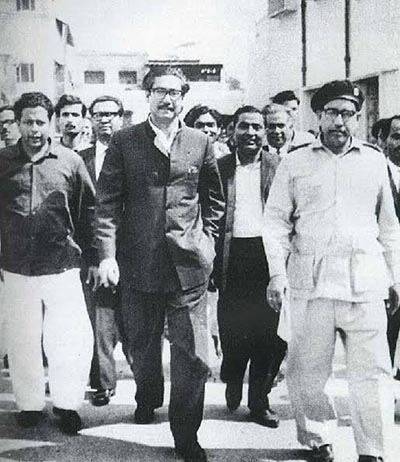
Bangabandhu’s popularity skyrocketed and he became the undisputed leader of the Bengalis, who found their savior in him, who heard their voice resonating in him - stronger and stronger ever. And such was the extent of his popularity that the military junta of Pakistan was forced to withdraw the false and infamous ‘Agartala Conspiracy Case’ and drop all fictitious charges against him and release him unconditionally from the prison in the wake of a mass upsurge in East Pakistan in February 1969.
Sheikh Mujibur Rahman was conferred with the title ‘Bangabandhu’ at a mammoth rally of students and masses at Race Course Maidan (February 23, 1969).
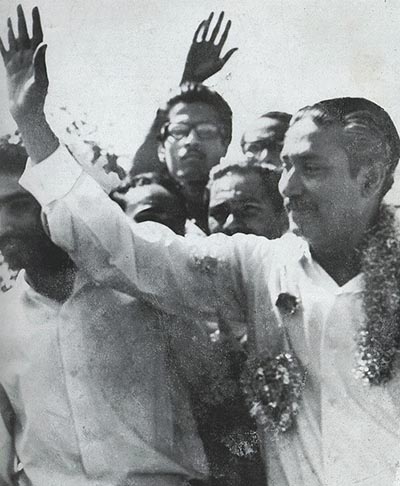
His love for his people and people’s love for him were unparalleled in the history of Bengali nation. The even stronger Sheikh Mujibur Rahman was proudly and adorably given the title ‘Bangabandhu’ (Friend of Bengal) by the students, who spearheaded the mass movement in 1969 to free the leader of Bengalis from prison.
The wave of Mujib compelled the military dictator Ayub Khan to resign in March 1969.
Another military general Yahya Khan took over the Presidency from him. Yahya Khan promised to hold general elections and establish democracy in the country. Sheikh Mujibur Rahman became the soul of 75 million Bengalis, the lighthouse of Bengalis, who started believing firmly that this gifted great man would create history for them, would emancipate them, would give them an independent motherland.
The general elections in Pakistan were held in December 1970 and Bangabandhu’s Awami League won a landslide victory both in the National Assembly in the entire Pakistan and in the Provincial Assembly in East Pakistan. There was a devastating cyclone in the Southern coast of East Pakistan in November 1970 that killed an estimated half a million people and affected nearly five million.
The extremely slow response of Yahya Khan and his military regime to address the unprecedented degree of casualty, sufferings and distress of the people affected by the cyclone was heavily criticized by the Bengalis.
Bangabandhu, with the landslide victory in the December 1970 general elections, was the rightful claimant to the power in Pakistan. But the military junta, Yahya Khan, in conspiracy with Zulfikar Ali Bhutto, leader of a distant second largest party in Pakistan, resorted to different ploys and kept on postponing the inaugural session of the elected General Assembly.
Meantime, Yahya Khan, was bringing in troops from West Pakistan to East Pakistan in a clear show of strength that he would violently subdue any civil movement of the Bengalis led by Bangabandhu. In such a tumultuous time, came out the “Poet of Politics”, the always larger than life leader, and the spirit of Bengalis, Bangabandhu Sheikh Mujibur Rahman, on March the 7th, 1971 in the afternoon at the Ramna Race Course Ground in Dhaka.
In a massive sea of people numbering more than two million, the leader urged upon his people for civil disobedience and peaceful non-cooperation against the military regime, and at the same time warned the brutal dictatorship that if the oppression and killing did not stop then the Bengalis would be prepared for the struggle with whatever they had.
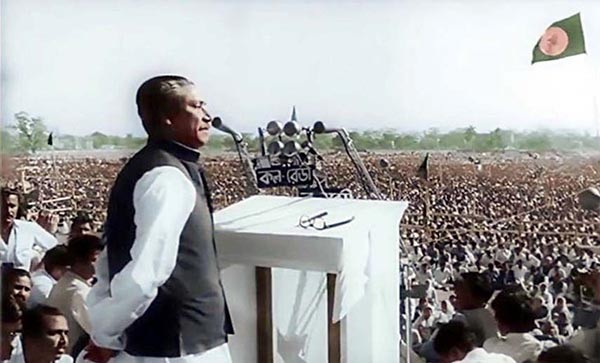
In his clarion call to the people, Bangabandhu declared, “The struggle this time is for our emancipation! The struggle this time is for our independence!” No wonder that this extempore masterpiece poem, this magnetic, mature and iconic speech of Bangabandhu has been included in the year 2017 in the Memory of the World International Register, a list of world’s important documentary heritage maintained by UNESCO.
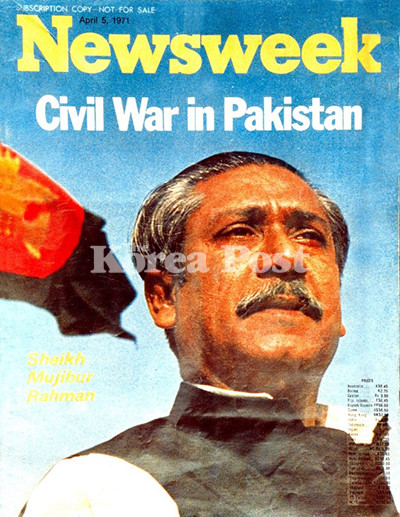
Yahya Khan continued his ploys in a bid to killing time and on the dark night of March the 25th, 1971 unleashed a campaign of Genocide on Bengalis by signing and authorizing “Operation Searchlight” - the ruthless and brutal military operation by the Pakistan military to decimate the Bengalis.
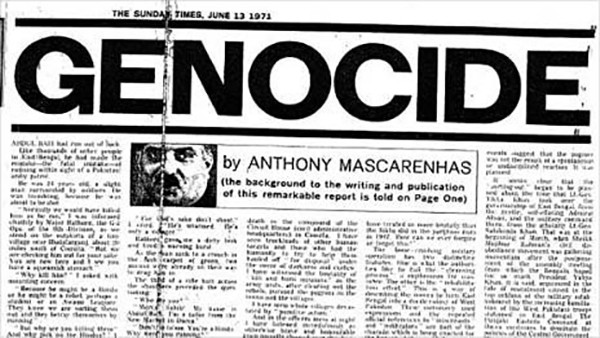
Bangabandhu, in the early hours of March the 26th, 1971, declared independence of Bangladesh and there began the Historic War of Liberation of Bengalis.
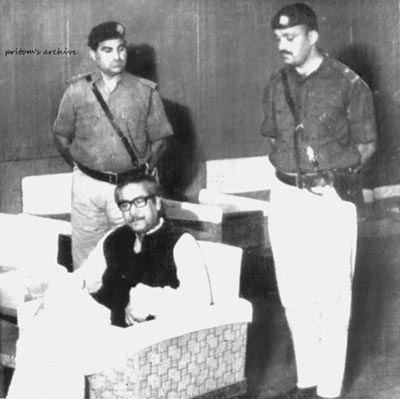
Men, Women, young and old, all freedom loving Bengalis responded to Bangabandhu’s call and joined the War of Liberation. Bangabandhu was arrested immediately afterwards and was taken to a prison in West Pakistan.
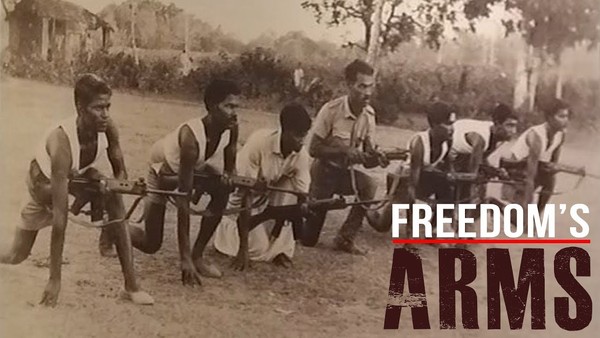
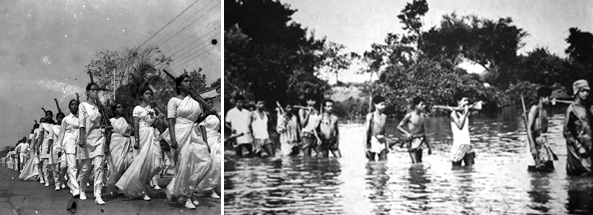
The first Government of Bangladesh was formed on April the 10th, 1971 with Bangabandhu Sheikh Mujibur Rahman as the President of the People’s Republic of Bangladesh. The first cabinet of Bangladesh took oath at a ceremony at a place now known as Mujibnagar in present Meherpur district of Bangladesh on 17 April 1971.
The nine-month long War of Liberation culminated into victory with the surrender of Pakistan military to the joint forces of Bangladesh Freedom Fighters and the Indian Armed Forces at a public ceremony at Ramna Race Course in Dhaka in the afternoon of December the 16th, 1971.
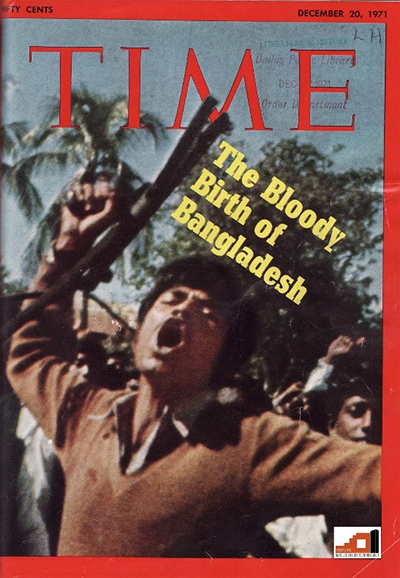
The nation paid a heavy price for its independence - three million people were martyred and more than two hundred thousand of women were violated by the Pakistan military and their local accomplices - the War Criminals and the Collaborators.

The military junta of Pakistan, in a sham trial during the War of Liberation, sentenced Bangabandhu to death for what they called “treason”. The brutal dictatorship was compelled by the pressure from the global leadership to free Bangabandhu from the prison of Pakistan on January the 8th, 1972.
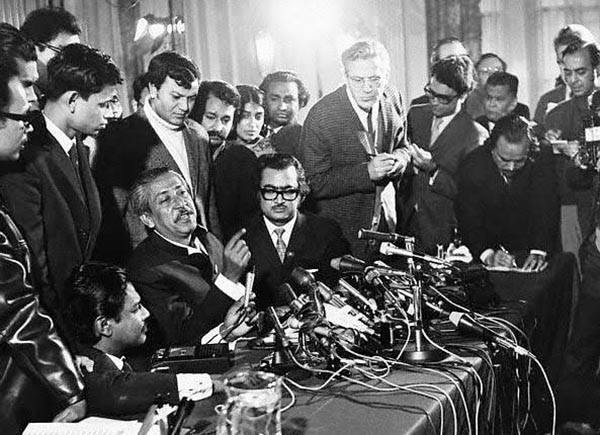
Then came the auspicious day, January the 10th, 1972 - the most revered leader of Bengalis, the leader who could lead the nation from anywhere and everywhere - from the midst of millions or from the dark cell of a prison - he could energize the mass, could guide them into the right direction, and could speak from the heart and head of every Bengali as to what to do and what not to do particularly at the most critical moments - arrived in his beloved motherland - the independent Bangladesh - touched her sacred soil with tears in his eyes, and embraced his people, hundreds and thousands in number.
The people were ecstatic and jubilant - they were chanting “Joy Bangla” (meaning Victory of Bengal), the slogan of Bangabandhu, the slogan of the War of Liberation, at the top of their voice and from the deepest corner of their heart. Every one of the millions wanted to see him and touch him - they felt that their leader’s dream - their dream - an independent Bangladesh - was a complete reality with the Father of the Nation now physically present among them.
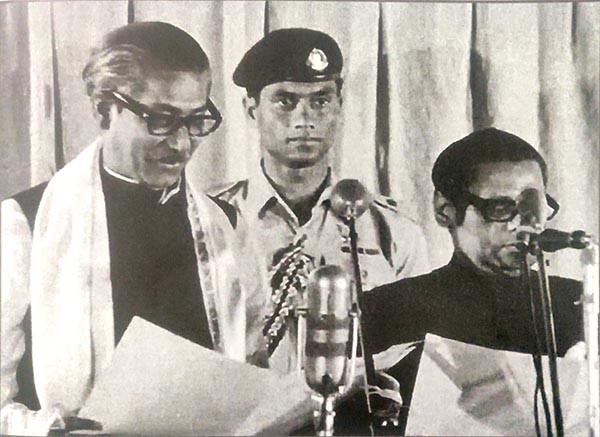
Bangabandhu was, is and will always remain the physical and spiritual embodiment of our independence - the soul of our Bengali nation, the symbol of our Bengali identity, the dreamer of ‘Shonar Bangla’ (meaning Golden Bengal).
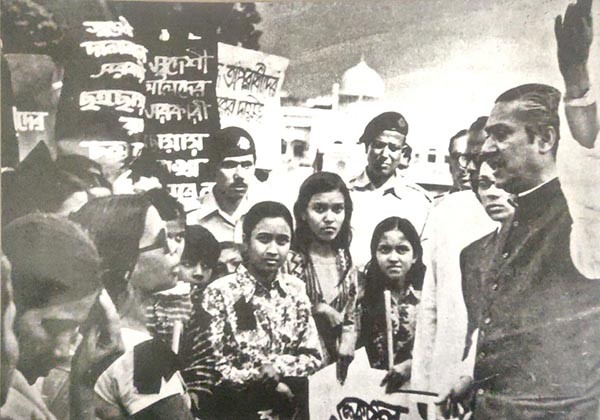
Immediately upon his return to Bangladesh, Bangabandhu, who sacrificed everything in his life for his people - for his Bengalis - began the Herculean task of building the war-ravaged country. His great statesmanship, his indomitable spirit, his boundless courage, and his hypnotic charisma earned him and Bangladesh the recognition from the global community in a short span of time. Wherever he went around the world, he became the centre of attraction and earned respect for him and his country. Bangabandhu became the symbol of democracy, peace, secularism, and fighting for the oppressed and against the oppressor around the world. When he was overcoming the challenges, one after another, and leading the secular and democratic country to peace, progress and prosperity - then came the darkest day in the history of independent Bangladesh.
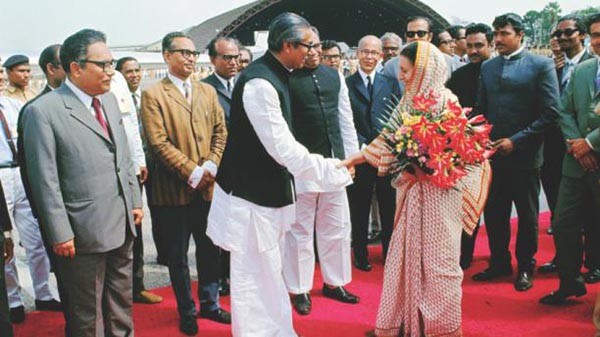
Father of the Nation Bangabandhu Sheikh Mujibur Rahman and most of the members of his family, except his two daughters, the current Prime Minister Sheikh Hasina and her younger sister Sheikh Rehana, were brutally assassinated by terrorists - a handful of anti-liberation, treacherous and notorious military officers at his Residence in Dhaka on August the 15th, 1975.
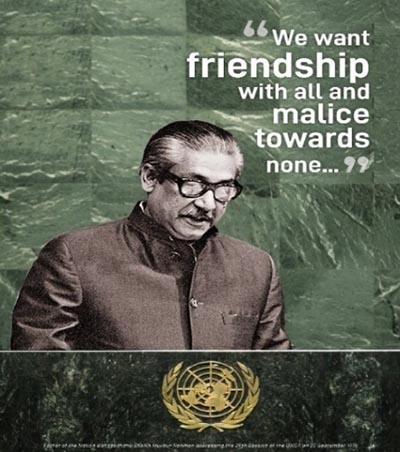
Since the assassination of Bangabandhu, the anti-liberation forces, ruled the country through illegitimate means for more than two decades. The eldest daughter of Bangabandhu, Prime Minister Sheikh Hasina, now in her third consecutive term as Head of Government and in total the fourth, with her visionary and dynamic leadership, is taking the country through an impressive socio-economic developmental journey to realize the dream of the Father of the Nation - ‘Shonar Bangla’ (Golden Bengal) into a realty. Bangladesh is already a lower middle-income country, has qualified to be a developing country in 2024, and has a ‘Vision 2041’ of Prime Minister Sheikh Hasina to be a developed country by 2041.
Bangabandhu would have been 100 years of age now. 45 years after his physical absence, Bangabandhu is even more powerful and more relevant in today’s somewhat tense and chaotic world. Bangabandhu is a global lighthouse, one of the tallest leaders and statesmen in the history of the world, a towering personality, and the Greatest Bengali of all time who would continue to show us the right direction for all the time to come. Bangabandhu can’t die. Bangabandhu doesn’t die.

